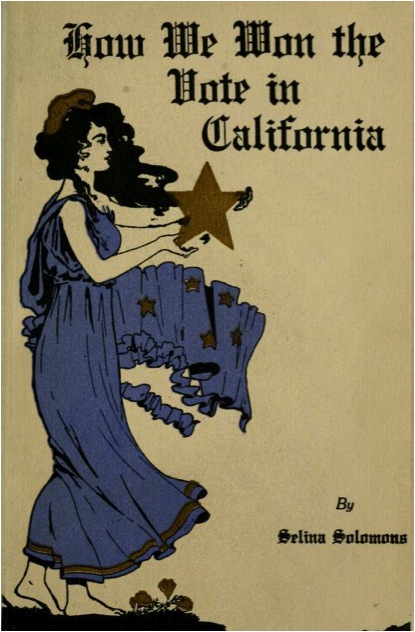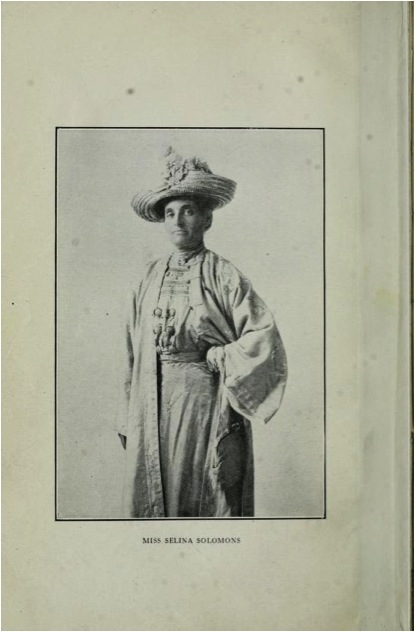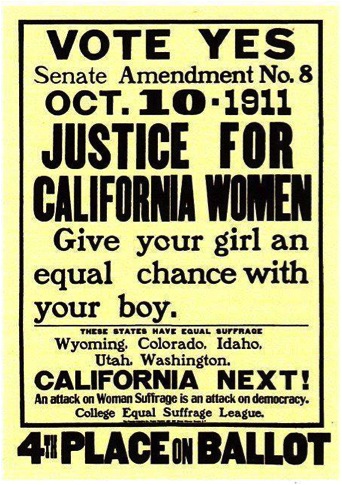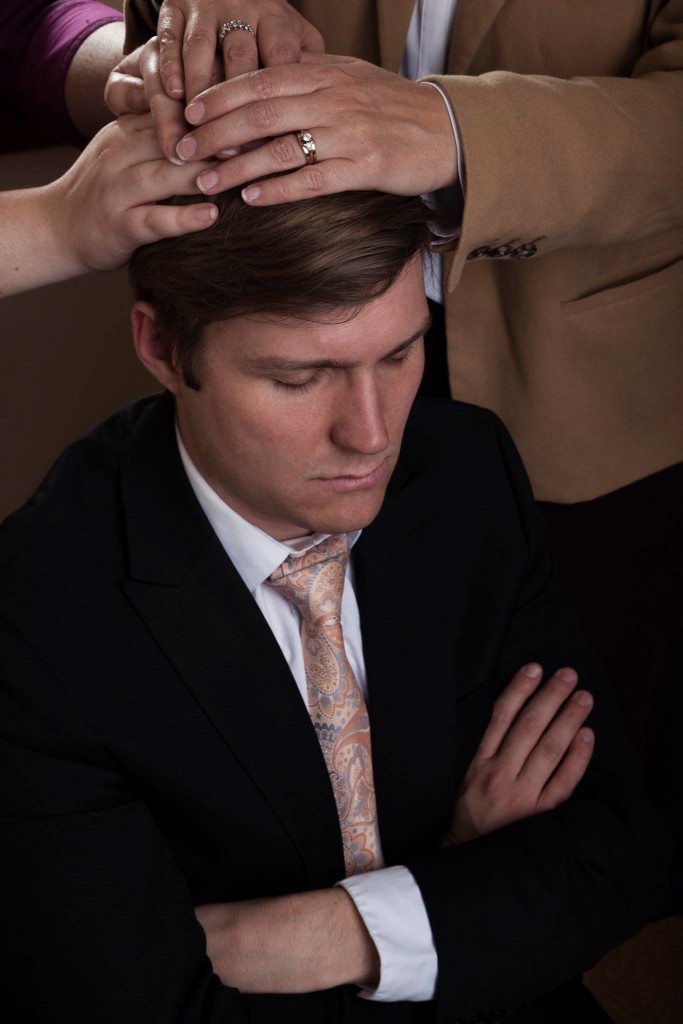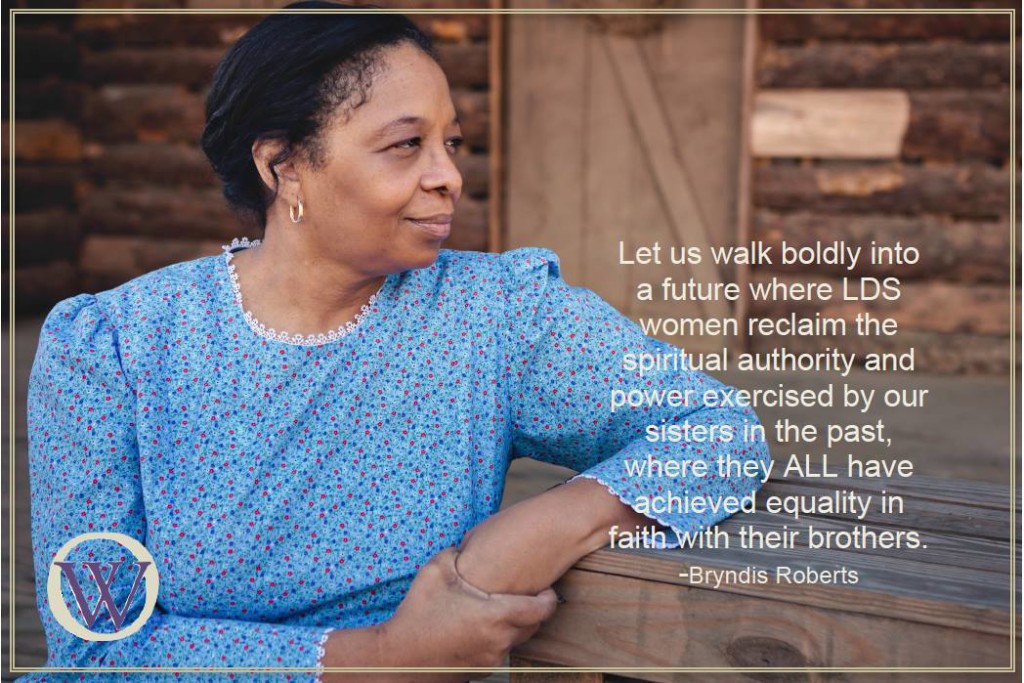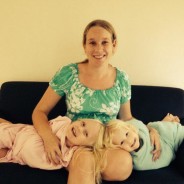A Celebration of Women’s History: Soup, Salad, and Suffrage
Ordain Women is hosting a weeklong celebration of women’s history in recognition of this years theme, “Honoring our past, envisioning our future.” Each day this week we will be sharing a new post highlighting stories of women from all over the world, submitted by you. If you would like to share women’s history from your area, you can send your submission to: ordainmormonwomen@gmail.com. This post is one installment in this series.
“The shop girls who gathered for lunch at the Votes for Women Club on Sutter Street [in San Francisco] probably never imagined that a century later their state would be represented by two women senators,” wrote author Elaine Elinson in “Soup, Salad, Suffrage: How Women Won Their Right to Vote in California.” Elinson continued, “These possibilities, however, may not have been far from the dream of the club’s founder, Selina Solomons, a visionary suffragist who devoted her life to winning the vote for women.”
Solomons’s dream of women’s suffrage in California was realized in 1911, when “California passed Amendment 8, granting women the right to vote in state elections almost a decade before the 19th Amendment provided women’s suffrage throughout the United States.” Solomon’s organizing manual, How We Won the Vote in California: The True Story of the Campaign of 1911, is a firsthand account of the “lobbying, fundraising, precinct walking and arm-twisting efforts” that were needed “to convince a majority of male voters that they should share that right with women.”
An attempt to win the vote for California women in 1896 failed by 15 votes, despite the fact that nationally-recognized suffrage leaders Susan B. Anthony and Dr. Anna Howard Shaw campaigned throughout the state and, Solomons noted, won “thousands for the cause.” However, she added, “the masses of the people in the cities were in a state of deadly apathy.” Too, Elinson wrote, “class divisions within the women’s movement–between the trade union women and the middle class reformers–often seemed irreconcilable.” The movement needed the support of both the Protestant elite and the “shop girls and clerks.”
Solomons, the daughter of middle-class Jews who had suffered an economic reversal, understood this. She decided to open “the Votes for Women Club in a loft near Union Square. The club, festooned with suffrage-yellow paper flowers and banners, was aimed at working women. Equipped with a kitchenette, it provided nutritious dishes for a nickel each.” Solomons hoped that the shop girls who came to eat would stay and read the suffragist literature and attend the club’s lectures and performances advocating the vote for women. They did, and Solomons enlisted their help in canvassing the poor, working-class and immigrant neighborhoods.
During the week leading up to the election, Solomons recorded, “Open-air meetings were begun rather timidly at first, but soon all caught the fire … and working women, college women, club women and home women alike were speaking from automobiles, and even soap boxes, ‘to the man in the street.’” When Election Day came, wrote Elinson, “the Votes for Women Club went on the lookout for fraudulent ballots and helped mobilize more than 1,000 poll watchers.” Though the “vote was so close that early editions of both The Chronicle and Examiner declared suffrage had lost,” statewide, it narrowly passed. “October 10, 1911 proved to be the greatest day in my life,” Solomons proclaimed.
Reflecting on the day she officially registered to vote, Solomons wrote, “Was it a dream? Some of us rubbed our eyes, remembering that time, only one short year and a half ago, when our little band of insurgent women besieged the registration office with a pseudo-serious demand to be registered. This time the placard ‘all citizens must register’ would have stated a fact! This time our request was not refused!”
Like women’s suffrage, where gender equity exists, it was not a gift. It was won by persuasion, long-suffering and countless “little band[s] of insurgent women.”
This post was submitted by Lorie Winder Stromberg who is on the Ordain Women Executive Board and lives in California.
Sunday Spotlight – Matt
This week, we hear about Matt Toronto and what his vision is for Mormon feminism and female ordination:
I have been a member of the LDS Church all my life. I was taught feminism in my youth by goodly parents, especially my mother. They taught me God’s love by loving me unconditionally. They also taught me that while the Church is instrumental in dispensing the gospel of Christ, there are basic deficiencies in the doctrine and practice of our religion that have been perpetuated by millennia of patriarchal culture. Here are some of the truths I learned from them throughout the years:
-
The scriptures, while holy and true, are written entirely from male points of view and fail to adequately represent women’s interaction with deity, nor do they contain enough well developed models of female spirituality.
-
Heavenly Mother is missing from our discourse and is essential to our full understanding of God and ourselves.
-
Marriages are meant to be co-equal in every sense.
-
Submission of women to men is damaging and leads to unbalanced marriages, resentment and the perpetuation of inequality throughout the world.
-
Roles and distribution of labor in a family are flexible and should be decided on by both partners in a marriage and not prescribed from an outside source.
-
Revelation and miracles are equally available to men and women.
-
Oppression is most insidious when the oppressed don’t realize they are being oppressed.
-
A father’s place is in the home too.
-
Discrimination against women hurts everyone.
-
Women should be ordained to the priesthood; In fact, it is God’s will.
For me, these truths have been confirmed through the Holy Spirit with the same power and in the same voice that has confirmed the reality of Christ’s Atonement, the restoration of the Gospel, and God’s infinite love.
I struggle to reconcile my love for the gospel with a painful awareness of inequalities in the church. Christ’s teachings should lead away from these inequalities rather than perpetuate them. I pray regularly- both for members and for the leadership of the Church- to recognize the truths I learned from my parents. I pray for us as the body of Christ to enact real and meaningful change. I pray to know what actions I can take to help this process.
One of the most important inspirations that has come as a result of my prayers encourages me to follow the example of my own parents and teach these truths to my children. My wife and I are committed to this effort; While we don’t do it perfectly, there are opportunities all around us to help our children understand the gospel in the context of full equality for all people.
We try to run our family as coequals who make decisions together. We also include our children’s voices in family decisions, whether we are deciding what to do on a Saturday afternoon or whether to move across the country. We take equal responsibility for nurturing and providing for our family, without artificial boundaries along gender lines. This has led us to some creative configurations of earning and child care that aren’t neatly categorized, but somehow fit our family in the right ways. Sharing responsibilities has had a direct impact on housework that allows us to work according to our preferences, not according to our biology.
One of the most important ways we weave elements of feminism into our family is how and what we teach our children. When we discuss the gospel, we explore the role of women in our spirituality. We encourage our daughter and our sons to look for female role models. When reading the scriptures together, my wife and I take care to point out male-oriented language. We explore how women might have felt in times that were dominated by a patriarchal culture and compare it to what women experience today. We encourage our children to contemplate our Mother in Heaven- including her in our discussions about our relationship to the Divine.
We share our feelings about the ordination of women with our children and we pray together regularly for women to receive the priesthood. We also pray for LGBT members to be received with full fellowship into the church. This has special relevance for our children because of their love for their grandmother and her wife.

Recently we begun blessing our children together. This year my wife and I laid our hands on our children’s heads to bless them before the first day of school. They each received two blessings: one from me and one from my wife. While my wife doesn’t hold the priesthood, (and didn’t claim to perform the blessings by that authority), the power of her words carried as much spiritual promise as I have ever witnessed in a priesthood blessing. That power came by virtue of her faith and the strength of her love. It felt right to bless them together because we raise them, teach them and love them together.
Although these blessings had a great impact on our children, the experience for me was particularly special. I have given many blessings for various reasons and with various people, but blessing my children with my wife brought a spiritual unity that far exceeded any of those other experiences. The love I have for my children was compounded and added upon by the unmatched love my wife has for them. This joint spiritual action seemed to invoke the total union promised us in our sealing in the Lord’s house many years ago. It’s a moment that I will always cherish, and I look forward to many more.
I don’t know how or when women will be ordained to the priesthood. I only know that it will happen. I often feel like I am doing too little to support this important cause. The truths that drive this effort have been emblazoned upon my soul by my wise parents and reinforced and enlarged by my prophetic wife. I can only hope that as I strive to teach these truths to my children, that they will embrace them and reflect them back to me with greater insight. Whether or not they enjoy a church with a joint priesthood, I know that there will be three more people in the world who understand.
The hearts of the children shall turn to their mothers.
Over the course of 2015 the work of Ordain Women has been guided by the theme “Honoring Our Past, Envisioning Our Future.” I will admit that my reaction to this theme when first approved was a resounding meh. I’m the granddaughter of a legitimate Daughter of Utah Pioneers; my not-so-distant progenitors crossed the plains, some of them dying; and my grandfather’s grandfather went to jail for practicing polygamy post-Manifesto. Even so, I don’t care much for Pioneer Day and I certainly don’t want to go on my stake’s Trek next year. I’m just not that big into the Utah-centric pioneer worship we tend toward. And though I have been known to speak dismissively of my bonnet-bearing foremothers, I cannot imagine a more hopeful act, grounded in the future than leaving the comfort of home to follow God. The lyrics of Come, Come Ye Saints are all about the future:
We’ll find the place which God for us prepared,
Far away in the West,
Where none shall come to hurt or make afraid;
There the Saints will be blessed.
We’ll make the air with music ring,
Shout praises to our God and King;
Above the rest these words we’ll tell—
All is well! All is well!
Can’t you see their faces, shining bright with hope, as they sang those words? These women of my past gave their every thing to bring about our future—whether in Utah or Uganda or Ukraine—their vision and bravery made this church possible.
Thankfully, my raging apathy toward the past cannot compare to my absolute belief in the power of the future. And that belief is probably one of the things I love most about my Mormon faith. I find the 9th Article of Faith to be some of the most hopeful words ever written: “We believe all that God has revealed, all that He does now reveal, and we believe that He will yet reveal many great and important things pertaining to the Kingdom of God.” We are a people constantly looking forward to the next parting of the veil, the next glimpse of the finger of God, the next revelation. Granted, it’s been a while, but I am not without hope, and I believe that Ordain Women is part of that next moment.
As I look back on the year that we have focused on our past, I find myself grateful for those pioneers. Their example has inspired me to do hard things and to act with conviction. As we prepare for our next public action, I believe we are accepting the challenge from President Gordon B. Hinckley to agitate faithfully for women’s ordination. Ordain Women supporters will be publicly reenacting important events in the history of Mormon women. We will present the true stories of traditional pioneer women who blessed and anointed each other; we will tell the tale of women and girls who, when World War II ravaged their country, blessed and passed the sacrament of Jesus Christ to their congregations; and we will try to recreate the emotion and euphoria of the moment our sisters of color learned that the blessings of the priesthood and the temple would no longer be withheld. We will then invite women of today to express their hope for the future both in words and by hanging a symbolic key. This will be a beautiful opportunity to connect the work and wisdom of our foremothers to the future we envision. I invite all to join us!
Honoring our past,
Envisioning our future.
Debra Jenson, the author of this post, is Ordain Women’s Executive Chair and the Chair of the Communications Committee.
Hidden Women
Several years ago, my publisher asked me to take on a project to write a book finding female ancestors. As I researched, I realized the reason they can be so hard to find is because they lack a voice of their own.
There was a time when a woman could live her entire life without being identified by her own name. As the “hidden woman” slowly began to be found in property records, membership rolls, even licensing a dog, it occurred to be just how far behind the times we remain as Latter-day Saint women. For generations, the source of a woman’s identity was usually under that of her husband, a feme covert (literally meaning “covered woman”) and that was how she was permitted to interact with various jurisdictions of government. Here are just a few random examples of how slowly the law changed to uncover the sisters who came before us. 1895 of 46 states: in 14 states a wife’s wages still belong to her husband; in 37 states a woman has no legal right over her children; and only four states or territories allow a woman to vote in general state and federal elections. 1907 the Expatriation Act states that a female US citizen who marries an alien takes in the nationality of her husband (34 Stat. 1228 s 3). This is repealed in 1922, but citizenship is not restored until 1936. 1920 The 19th Amendment to the Constitution is ratified, giving women the right to vote. 1950 Virginia becomes the last state to allow women to sit on juries.
If we are equal in the eyes of the law, are we not equal in the eyes of God? The course of centuries reveals how, bit by bit, women were allowed to own separate property, have rights to their children, witness a deed, execute an estate, and other privileges men enjoyed under the law. Every state was different, but a parity in most areas was achieved by the mid-20th century. Yet LDS women remain trapped in the 19th century, their voice unequally yoked without ordination to the priesthood. Things that seem so simple and natural are beyond our grasp: Witnessing a baptism or temple sealing Blessing our own children Consecrating sacred oil Passing the sacrament We know men are fallible and God and His Son are perfect. We know prophets have made mistakes, most recently noting the century plus it took to get the priesthood restored to African-American men. Those who objectively read the history know that this was because of the open bigotry on the part of Brigham Young and other leaders. If you will, please entertain the thought that the reason women have second class status is due to years of ingrained prejudice–in the name of lack of revelation–among our male counterparts. If you have not considered this before, I ask you to do so now. “There is neither Jew nor Greek, there is neither bond nor free, there is neither male nor female: for ye are all one in Christ Jesus.” — Galatians 3:28 Do our Heavenly Parents love us any less? The answer is no. Do they want us to be anxiously engaged in service? Of course. Should we have all the tools our brethren posses to serve and bless others? I know what I believe to be the right answer. How about you?
Honoring our past.
Envisioning our future.
Christina K Schaefer, the author of this post, is a nationally published author and speaker. Her books have won numerous awards including being placed in the Authors’ Room in The Library of Virginia. She is a member of Newport News VA Stake and serves on Ordain Women’s Social Media Committee.
Sunday Spotlight – Kristy
Today’s Sunday Spotlight features Kristy, who talks about her love for the Church as well as what changes she would love to see implemented.
- What gives you hope for the future
Watching my two girls in the world, here in Athens, at the park, at home, at school, you name it. They are bright, inquisitive, full of wonder and courage, and I would imagine nothing is impossible in their eyes. This is the generation that will see full gender equality, in my estimation. So even if it might seem bleak for me right now, they won’t have to deal with what is going on right now. Change happens, and 25-30 years from now we will read books about current gender dynamics in our culture and wonder, wow, was it really like that? We’ve come a long way, but there’s more to come. And we will get closer and closer to our goal as each and every woman (and man) who wants better for the next generation stands up (in their own way, it doesn’t always have to look the same, or the way I’m doing it) and lets others catch a glimpse of their authentic selves, when they reflect to the world how they really feel inside about their worth, their roles, and what they want. As a psychologist with my own private practice specializing in women’s mental health, I see that process as key to a fulfilling life. And deep inside, every person knows what that would look like for them, it’s just a matter of excavating that dream and taking the risk of being vulnerable to those around you.
- Aside from ordination, what are some changes you would like to see implemented immediately in the Church?
I’m quite biased, but I think letting women hold their babies for their blessings would be amazing. It just makes so much sense. Especially in cases where a single mom is having her baby blessed, and she would be the only one up there with a genetic link to the baby. And when converts to the church are anticipating the ceremony (domestically and internationally), if they are coming from another religious tradition they may be expecting to both be able to go up there since Christenings typically have no gender restrictions for parent participation. I can just imagine the disappointment when the parents find out they cannot do that together. Other changes I’d love to see would be equal program budgets for boys and girls, ending worthiness interviews for females ages 8 and up (unless perhaps there’s another woman present), and instituting female Sunday school presidents.
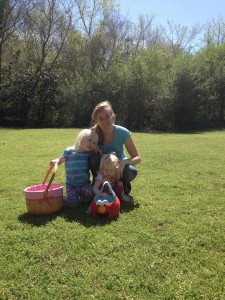
- Tell us more about your connection to Mormonism?
My Mormon roots go very deep. I was born in the covenant, baptized at 8, I have pioneer heritage on both sides whose sacrifices I honor and I feel I’m being true to their memory in the way I am trying to carve a trail for myself and my family that is authentic and true, come what may. Temple Square was/is one of my favourite places in the world. I used to save up when I was little to buy plane tickets to see my family in Utah (and back when we could still do triangle flights!) and CA when we lived on the east coast. And I would always beg to go to Temple Square. During Christmas the lights made my soul happy. Pretty much all of my family still lives in Utah and CA, so whenever I visit Utah again and our plane starts its descent into the valley, I see Mt. Timpanogas, then Mt. Olympus, the Y, and the Great Salt Lake, and it still feels like I’m going home.
4. What are some of the things you love about the Church?
I love the people. They’re my people. And I’ll never give up on them. Every culture has its quirks, and some doctrinal quirks too. But I love how fluid the Church’s doctrine has the potential to be because of the principle of further light and knowledge that comes as we seek use our agency for good. And boy, do Mormons know how to put their shoulder to the wheel when there’s something or someone in need. People in our church are hurting over gender inequality, and it’s only a matter of time before the conversations spreads far and wide enough into every home, every congregation, that people realize there’s something we need to do about it. In fact, I see it already happening. The conversation has begun. Great things are in store because I have faith in the community’s capacity to listen to and uplift one another. There’s no challenge too big for Mormons.
Equality is Morality
After a hiatus of several years, in 2013 I began actively attending church. I was inspired to return while reading Joanna Brook’s “Book of Mormon Girl” and while attending the Ordain Women Launch Event in April of that year. As I sat listening to the speakers at the launch event, my heart soared. These people clearly understood that equality is morality.
Shortly after returning to church activity, a friend in my ward pushed back against my view of morality. His challenge came in the form of an angry comment to a pro-Ordain Women post on my Facebook wall. His charge was that my lack of obedience to authority demonstrated a lack of morality. My response: Matthew 7:12.
“So whatever you wish that others would do to you, do also to them, for this is the Law and the Prophets.”
In this simple statement Jesus explained the foundation of true morality. It is a rule of aspirational reciprocity. Because we all desire to be valued by others, we violate this Golden Rule, whenever we treat others as “less than.” In this way, the Golden Rule is a radical call for equality. It is born of the idea that we are all God’s children, and that we all have the same inherent worth before God.
Paul imbued this idea with universality when he said: “There is neither Jew nor Greek, there is neither bond nor free, there is neither male nor female: for ye are all one in Christ Jesus.” Galatians 3:28
As I sparred back and forth with my friend on Facebook, I realized that the source of our conflict sprang from two very different ideas about morality. My friend’s view of morality had a familiar ring. I teach law, and during the first night of each class, I discuss the origins of “government.” Traditionally, governments have been ruled by the elites of a society. The elites historically fall in to three groups: 1) violence specialists, 2) technocrats, and 3) religious specialists. While the relative position of each group in the power structure may vary from government to government, each group plays a vital role in maintaining rule by the elites. In particular, religious specialists develop and spread myths throughout a society, which explain why the elites should rule, and why the rest of the society must follow. Normally, this involves some explanation of why the gods have given the elites special powers and positions in society, along with a warning that challenging the elites is equivalent to challenging the gods. Thus this traditional form of morality warns that questioning elites is the same as questioning the gods, and thus questioning comes with eternal consequences. “If you challenge the King, your loss will not be limited to your head, but also your eternal soul.”
In the middle of our Facebook encounter, I realized that this was my friend’s morality paradigm. It is based on obedience to authority. Compliance with authority is good. Challenges to authority are bad.
I love the New Testament, because it is a radical departure from traditional obedience morality. Jesus was a radical. His teachings were subversive. He challenged the Roman and Jewish power structures under which he lived, and paid with his life. His teachings were subversive, because the called for equality.
The Jewish power structure insisted that Jews were above Samaritans, but Jesus told the story of a Samaritan hero, how helped an injured Jew and put Jews to shame.
The Jewish system of hierarchy insisted on male supremacy, but Jesus insisted on interacting with women in forbidden ways, and upon his resurrection he appeared to women first.
Jesus explained his ideal in the Sermon on the Mount, in which he turned the world upside down. In this new world, the traditional elites would be at the bottom. Matthew 5: 1-11.
5 Now when Jesus saw the crowds, he went up on a mountainside and sat down. His disciples came to him, 2 and he began to teach them.
He said:
3 “Blessed are the poor in spirit,
for theirs is the kingdom of heaven.
4 Blessed are those who mourn,
for they will be comforted.
5 Blessed are the meek,
for they will inherit the earth.
6 Blessed are those who hunger and thirst for righteousness,
for they will be filled.
7 Blessed are the merciful,
for they will be shown mercy.
8 Blessed are the pure in heart,
for they will see God.
9 Blessed are the peacemakers,
for they will be called children of God.
10 Blessed are those who are persecuted because of righteousness,
for theirs is the kingdom of heaven.
11 “Blessed are you when people insult you, persecute you and falsely say all kinds of evil against you because of me. 12 Rejoice and be glad, because great is your reward in heaven, for in the same way they persecuted the prophets who were before you.
True morality must be based on equality, because inequality fundamentally involves one person being able to compel another to act. This becomes a form of coercion, whereby the dominant person can force the subordinate person to act as the dominant person wills. Masters compel slaves. Husbands compel wives. Males compel females. Straights compel gays. The documented compel the undocumented. The rich compel the poor, etc.
Thus, white slave owners in the south used obedience morality to convince the their slaves to submit, and to relinquish control over their own bodies to the will of their masters. Masters would read to their slaves: “Slaves, obey your earthly masters with respect and fear, and with sincerity of heart, just as you would obey Christ.” Ephesians 6:5.
Likewise, men have long used obedience morality to compel women to submit, and relinquish control over their bodies to their husbands. “Wives, submit yourselves to your own husbands as you do to the Lord. For the husband is the head of the wife as Christ is the head of the church, his body, of which he is the Savior. Now as the church submits to Christ, so also wives should submit to their husbands in everything.” Ephesians 5:22-24.
As an aside, most Biblical scholars believe that Ephesians is pseudepigrapha. In other words, Paul did not write it, it was forged in his name. See, Bart Ehrman’s “Forgery and Counterforgery: The Use of Literary Deceit in Early Christian Polemics.”
Unfortunately examples of obedience morality are without end. Inequality always compels one person to submit their body to the will of another. This is theft of the worst kind, and cannot form the basis of true morality. After two years of work with Ordain Women, I have learned that the work of Ordain Women is sacred. By asking for ordination and equality in the church, Ordain Women is move us all toward a higher form of morality, where we all are recognized as equal before God.
Honoring our past,
Envisioning our Future.
Mark Barnes, the author of this post, is on the Ordain Women Executive Board and the Chair of the Male Allies Committee.
Achieving Equality in Faith REQUIRES Putting Intersectionality in Action!
The Ordain Women webpage boldly proclaims that we are “Mormon women seeking equality and ordination to the priesthood.” I was initially drawn to that bold statement in early 2014 and, after participating by proxy in the April 2014 Priesthood Action, I submitted a profile in September 2014 and prepared to join my sisters and brothers in the October 2014 Local Priesthood Action.
In my profile, I state:
I am very thankful that the priesthood has been restored to the earth. However, every time I rejoice that one of my brothers has been ordained as a priest, I also ache for all women in the Church and for the Church. I ache because my wonderful, talented sisters have skills, training, and experience that could greatly benefit the Church. I ache because, in many parts of the world, there are wards and branches that are in desperate need of more “leaders” and more priesthood holders, and by automatically excluding women from consideration, the Church is doing itself a disservice. I ache because so much of Heavenly Father’s work is not being done because there are not enough priesthood holders to do the work. I ache because, simply by virtue of our gender, all women are limited in the roles we can fulfill in the Church and, ultimately, in the roles we can fulfill in building Heavenly Father’s kingdom. As important as the work is, I cannot believe that it is the divine will that so many workers are not allowed to participate, fully and equally. I believe women should be ordained. (Emphasis Added).
When I submitted my profile, there was no question in my mind that the words “Mormon women” on the Ordain Women webpage included all Mormon women, no matter their race, color, national origin, socioeconomic status, gender identity, sexual orientation, marital status, geographical location, childbearing status, ability/disability, or educational background. As I became more involved in Ordain Women, however, I realized that, given the history of exclusion and discrimination by the LDS Church, particularly on the basis of skin color, it was not enough to think that there was no question as to the inclusivity of those words. I realized that each and every action that Ordain Women took needed to demonstrate that inclusivity and to make sure that no one was excluded from the dream of equality in faith. Otherwise, the dream of equality in faith would become a nightmare that continued to perpetuate a system where instead of “all [being] alike unto God,” some have more power and more privilege than others.
The Ordain Women Intersectionality Committee grew out of that realization. The purpose of the Ordain Women Intersectionality Committee is “to ensure that all statements and actions of Ordain Women reflect an awareness of, a support for the efforts of, and inclusion of all groups who have been historically excluded from full participation in the activities and ordinances of The Church of Jesus Christ of Latter-day Saints.” If those words resonate with you, we invite you to join us so that ALL of our sisters can achieve equality of faith with ALL of their brothers.
Honoring Our Past,
Envisioning Our Future.
Bryndis Roberts, the author of this post, is on the Ordain Women Executive Board as the Intersectionality Chair.
Sunday Spotlight – Cory
Today’s Sunday Spotlight is from Cory, a male ally who shares his perspective on Mormonism and gender inequality.
Tell us more about your connection to Mormonism?
My first really meaningful interaction with Mormonism was when I was dating a girl who was a member of the Church during high school. She had a really great relationship with her dad and that was something that was missing in large part from my life. By watching her family, I learned a lot about the Church- both good and bad.
At the very end of my senior year, I was talking to another friend, who was an inactive member. I was wondering what life held after high school, because I didn’t have any plans in place and I voiced those concerns to her. She invited me to take the discussions in her home. Her family had always loved me and treated me well, so I accepted the invitation. I became a “golden contact” for the sister missionaries and was baptized shortly after I graduated.
One thing that I remember from my experience in taking the discussions and committing to baptism that really stuck with me was my baptismal interview. All of my discussions were with the sister missionaries from my friend’s ward. I lived in different ward so, just prior to my baptism, the elders from my ward came to interview me. I expressed some concerns about them interviewing me since I had always met with the sisters. They told me that the sisters didn’t have authority to conduct this interview, anyway. I found it odd, but ended-up getting interview by two elders about my age who I had never met before. I remember feeling a tremendous loss that the sisters weren’t a part of that process.
What gives you hope for the future?
In general, I am an optimist. I also find joy in some really simple things like spending time with my family. I think being able to find joy easily makes having hope sort of natural. I also have a strong belief in the inherent goodness of people. More specifically, I see society trending toward more moral positions on issues. Even though people may be less religious than in years past, they are more moral in the way that they view social justice issues. I think the separation of morality and religiosity has really pushed through old dogmatic walls and has led us to a place where society can address equality issues through new eyes. While I find great value in the scriptures, I also think that understanding historical context is a really important part of the scriptures. Understanding how changes in technology and science impact the scriptures is a really important part of how I approach sacred texts. That allows my views to change while still being rooted in the past in a meaningful way.
Aside from ordination, what are some changes you would like to see implemented in the Church?
I really would like the Church to consider how it impacts people who don’t fit “the mold”. Single people, divorced people, LGBTQ people, people who cannot have children, women, people who have nuanced faith and others receive messages from the Church (often inadvertently) that tell them that they are not good enough. There is a great deal of pain caused by this. If Jesus Christ really made the sacrifice that the Church says He did, then the power of the Atonement is enough to compensate for any of our shortcomings. Like President Uchtdorf said, there’s room for everyone in the Church. We don’t need to be homogenous, because our differences (if they are errors on our part) can all be fixed through Christ’s sacrifice. I know that it would take a huge shift from the general membership of the Church to openly accept people who are that different in the Church, but I think it is critical for the Church’s long-term sustainability.
What are some of the things you love about the Church?
I really love that the Church mobilizes to serve people. I love that people are so dedicated to trying to help one another. I also really love Joseph Smith’s early vision of the Church. He was sealed to friends in the temple. I think he saw the ways that we are all interconnected and wanted that to be a really important part of the Church. Maybe, more than anything, I love that the Church teaches that we all have access to God.
Have you had a favorite calling in the church?
Absolutely! I was the Gospel Doctrine teacher in my ward. It was great for me because I not only had the responsibility to come prepared, I had a chance to highlight areas that I think were sometimes left undiscussed. It was a great couple of years for me. I was spiritually fed regularly and was really sad when I was released.
What are some examples of gender inequality you see in the Church?
There are so many. From unequal spending on the Young Men and Young Women to women not being allowed to approve their own budgets to the concept of presiding authority being determined by your sex, the Church is filled with examples. I’m not sure that I have a lot to say that’s new here. There is a scriptural basis for a lot of this and, until we have the courage to really look closely at the context of those scriptures, we will remain stuck in an unequal paradigm. For example, Paul said, “Let your women keep silence in the churches: for it is not permitted unto them to speak; but they are commanded to be under obedience, as also saith the law.” If we accept that scripture blindly, we will ALWAYS be battling for gender equality in the Church. If we can look at and say, “Wow. Paul really had some outdated views about women. Isn’t it great that we have come so far in this area? I wonder what we can do today to advocate for equality in the Church so that history won’t look at our day like we look at Paul’s day.” Having the courage to question things like that can become a springboard to making the Church an organization that is leading the way in the struggle for justice, equality and morality. I think we have a long way to go still, but I’m hopeful that we can get there.
A specific personal example of gender inequality has to do with my daughter. After making it pretty clear to her Achievement Day leaders that she wanted a lesson about more than doing crafts or ironing, they finally planned a physical fitness lesson. One of their challenges was to see how long each of the girls could jump rope. Let’s just say that the leader’s arms got tired after five minutes and my daughter never got to see how long she could go. She was so upset by that. When I contrast that with my boys’ experience in scouts and their training to do a triathlon, I realize that we aren’t doing the girls in the Church justice. Some girls want triathlons. Some boys don’t. It’s time to start recognizing the importance of individuality in our youth and treating them as people instead of roles.
How did you discover Ordain Women?
I have always taken issue with folk doctrine in the Church. One prevalent doctrine, in particular, was the idea that women have to wear a skirt or a dress to be considered appropriately dressed for Church. I could never support the idea that a woman in a denim jumper and a t-shirt was somehow more respectful to God than a woman in a sharp pantsuit. When Wear Pants to Church Day came up, I was a huge proponent. I contacted one of the organizers of that event and expressed support for what they were doing. Hilariously, I cautioned her that some people may take this as an effort to have women receive the Priesthood, so they should really be careful with what they are putting out there. I’m embarrassed to admit that the development of my feminism was a little slower than I wish it could have been.
I supported Let Women Pray when that came up, too. The fact that a woman hadn’t prayed in General Conference was rooted in no doctrine whatsoever and I suspect it wasn’t even done intentionally. Sometimes we just get stuck in doing things the way that have always been done. So I joined the movement that eventually led to sister Jean A. Stevens saying a prayer in the April 2013 General Conference.
Then Ordain Women showed-up. Supporting it really seemed to be a natural progression of the causes that I had supported. As I had supported the various movements that asked hard questions about gender equality in the Church, I really started to study the issue. As I read about Deborah in the Old Testament, I had a thought solidify in my mind- women had held the Priesthood anciently. The men who wrote the Bible didn’t say much about it, but Deborah’s contributions to Israel were so significant that they couldn’t be ignored. For Deborah’s contributions to be mentioned in the Bible (where we essentially see Paul telling women to shut-up) is a testament to what a great leader Deborah had to have been. As I read about the early days of the restored Church, I came to realize that Joseph Smith had envisioned a larger role for women than any religions of that day did. Women gave blessings and ran the Relief Society as an autonomous organization during Joseph Smith’s time as the President of the Church. The more I researched, the more I found precedent to support the idea that female ordination and gender equality are important gospel principles. It became easy to support OW at that point, so I submitted a profile.
What prompted you to put up your profile?
There were a couple of experiences that were key in my support of Ordain Women and gender equality in the Church. The first experience came early in my marriage. My wife wasn’t doing something I wanted her to. To try to get her to do it, I tried to pull Priesthood rank. I said, “My COUNSEL to you is…”. I immediately felt awful and manipulative, but I was determined to stick to my guns. That was until my wife began laughing at me. That experience made it clear that neither I nor my wife were comfortable with our relationship being built on either of us having more power than the other person. That moment established the equality in our marriage. When your personal life is built on a foundation of gender equality, it seems natural to want the same thing from your experience in the Church.
The second experience was having our daughter. She was holding her head up on her own from literally the day she was born. She was physically strong and we enrolled her in a dance class at age four to give her an outlet for her desire to be physically active. After a month, she voiced her displeasure with dance and wanted to try gymnastics. After a few weeks, they had a “meet” that was really just a show for the parents. I was unfortunately unable to attend. That night, I asked her about her meet mentioning that I heard she received a medal. She replied, “EVERYONE got a medal, Dad. I want to see if my gymnastics is better than the other girls’!” She went on to become a state champion. She has played volleyball and is currently playing tackle football in Pop Warner- her passion. Watching her made me realize how much I wanted her to grow-up outside of many of the gender expectations of the Church. I want her to decide what she wants to do free of externally-imposed expectations or restrictions.
I felt like submitting my profile to Ordain Women was a way to show my daughter that I felt that way. In fact, I wanted her in the picture I submitted for my profile, so that she would know what an important part she played in my submitting it.
Have your feelings grown or changed since submitting your profile?
I really wanted to keep this as positive as possible, but I have to delve a little into the negative to accurately answer this question. I found out from my current Bishop a few months ago that I was released from my calling after pressure from some ward members. That pressure did not come from my performance in my calling, but rather from the perception that I was “dangerous” after writing a blog piece that supported my opinion that Kate Kelly was not guilty of apostasy prior to her disciplinary council. I also wrote a subsequent piece for the OW blog that made many members of my ward uncomfortable. After meeting with my Bishop (a man who I love and respect) it became clear that my being at Church makes a lot of people uneasy. I felt that discomfort and have attended very infrequently as a result. My wife ended up resigning her membership after Kate was excommunicated. The easy answer would be for me to resign, as well, but I don’t want that. I still love the Church and want to be a part of it. It’s just very difficult to feel like my ward is my home. I want to find a way to change that, but I have to be able to find an authentic way to make it happen so far.
On a much more positive note, at the beginning of last school year it was the time that I would usually give my children father’s blessings. After my support of gender equality, I really felt like I needed to put my money where my mouth was. I asked my wife to bless each of the children. She did so under the authority of her love as a mother. I can tell you that the Spirit was present at those blessings more than any other blessing that I have ever witnessed. After that experience, I knew beyond a shadow of a doubt that love is the strongest spiritual authority there is. That realization seems consistent with what Jesus taught his disciples.
Have you had the opportunity to attend any actions? If so, what was your experience?
I attended a local action where my wife and I went to Priesthood Session at our local stake center, dressed in purple. As we entered, one of the counselors in the Stake Presidency warmly greeted my wife and then said, “Oh, sweetie, this meeting is just for the boys.”
She smiled and said, “I know.”, and walked right past him to take her seat. I admire her spirit.
How have people close to you reacted to your advocacy for women’s ordination? Do you see people’s opinions changing?
My wife and children have been incredibly supportive. My parents, who are not members, support my advocacy, but have asked me why I don’t just leave the Church since it doesn’t reflect my values with respect to gender equality. It’s really hard to put into words why I want to keep working to make the Church a better place in my view. For someone who hasn’t seen the beauty of the Church, it’s easy to just look at the shortcomings. The Church, in my view, has some work to do with respect to supporting equality, but that doesn’t mean that I think I should through the proverbial baby out with the bathwater. It’s a beautiful organization despite having a few issues that I see as needing to be fixed.
Do you live or have you lived outside of the USA? What impact do you imagine women’s ordination having on the church internationally?
I have never lived outside of the US, but I imaging gender equality being a universal good. I know that that may present issues in many cultures, but taking appropriate steps forward in every culture seems like a good course of action.
Is Telling the Truth about Inequality Anti-Mormon?
These last couple weeks I’ve been “nesting” in prep for my twin baby girl and boy I’m expecting this winter: bleaching the spit-up stains out of old onesies, folding swaddling blankets, and organizing to make room in our home for these babies who are making my belly grow exponentially by the hour it seems. As I prepare (and I’m a planner), I’ve been thinking about what we are going to do about their naming and blessing ceremonies. Since I’m under sanction not to say anything at church because of my unorthodox opinions, I think a request to simply hold them for their blessings would not go over well…again. My mind then wanders back to when I first asked my priesthood leaders to hold my last baby, the denial of which launched my activism. Afterward, when I shared that experience with the New York Times, things started to get real. The #1 feedback I received from hundreds of people, especially the more orthodox among us (even close friends/family), was that sharing my story was anti-Mormon. That I was hurting the missionary effort. At first, this confused me, because I was in the headspace, “I’m just sharing what actually happened. The truth–because I care. I want things in the church to change for the better, or else why would I risk so much?” But given what I’ve learned since then, I understand better why people reacted that way: it’s a reflex in our culture.
A lot has happened since the NYTimes story appeared March 6, 2014. I walked onto Temple Square with Rosie and my husband using my body to demonstrate my desire for change, I watched Kate read her excommunication letter, I’m not welcome at home anymore, I became pregnant with twins, I opened my private practice, and I lost my temple recommend for speaking up. But more important than my story is what has changed systemically between the story’s publication and today. The journalist not only pointed out what happened with Rosie’s baby blessing, she highlighted a number of inequalities in church practice, many of which have since been rectified:
| What NYTimes Pointed Out | Changes after March 6, 2014 |
| 1. Women can’t hold babies for their ceremonies | —— |
| 2. Governing authorities form an entire male gallery of leaders, linking visually to the biannual Ensign centerfold swimming in black suits/ties |
March 19, 2014. Portraits of Female leaders hang in Conference center along with male leaders for first time. April 2014. Ensign changed to include female auxiliaries more prominently for first time in gallery that NYTimes linked to April 2014. Female auxiliaries moved to middle of Conference Center from the sides to be featured more prominently during General Conference. |
| 3. All-male religious authorities ask women intimate details about their sex lives (and domestic violence/abuse situations) with no other women present
|
——— |
| 4. Women cannot handle book-keeping or finances for their congregations
|
——— |
| 5. Women can’t plan sacrament meeting services | June 15, 2015. Church announces women are invited to participate in meetings to plan sacrament services |
| 6. Women can’t be hired as seminary teachers if they have children under 18 |
November 15, 2014 Church changes CES policy so that women can be hired as seminary teachers even if they have children under 18, and won’t be let go if they get pregnant anymore. |
| 7. Women can’t be Sunday school presidents | —— |
| 8. Women can’t be ushers |
April 2014. Female ushers spotted in all sessions of General Conference for the first time, including priesthood session. |
| 9. Harmful chastity lessons for women include being compared to licked cupcakes, chewed gum, etc.
|
——- |
| 10. Activities for Young Men vs. Young Women are imbalanced. | ——- |
| 11. Leaders of women’s organizations were not currently present at all decision-making meetings |
August 18, 2015. Church announces 3 women invited to participate in 3 main Executive (decision-making) councils with previously all-male General Authorities for first time. |
Let me be clear: I’m NOT saying OW is responsible for these changes. The credit for these changes goes squarely to those in Church administration who implemented them. The Church could have completely ignored these raised issues. But it didn’t. It responded to the needs of women’s voices. I believe women and men in the Church Office Building had been advocating for many of those same changes long before 2014.
Some may argue that these are baby steps, or cosmetic changes show more concern for “looking good” rather than “being good” on women’s issues, thus raising more questions about systemic problems than these measures solve. But one thing is certain for me: the policy change for female seminary teachers NOT to be let go anymore when they have their first child, making women with children under 18 hireable now—that’s not a baby step. That’s huge. Countless families will now be able to make career decisions based on what’s best for them, not prescribed traditional gender roles.
The Church has corrected 5 out of 11 of the inequities Laurie Goodstein wrote about. That’s almost half, in a little over a year. Considering that Cheiko Okazaki pointed out in 2005 how she wished women could have been present in executive meetings after not being consulted for any of the wording in the 1995 Family Proclamation, I’d say the time it took between this national attention in March 2014 and now (September 2015) is pretty good. And some things, like letting women hold their babies for their blessings and allowing a woman to be present for interviews (to cut back on ecclesiastical abuse), may take a little longer due to perceived doctrinal constraints. For example, a friend asked a General Authority after a recent fireside if women could ever be allowed to hold their babies, and he told her no, because of his interpretation of a scripture in the D&C. But ever the optimist, I am certain these changes are coming. If there’s one thing studying church history has taught me, it’s never say never.
I don’t know what I’m going to do about my twins’ ceremony coming up, honestly. I’m just trying to focus on staying healthy while growing two human beings inside me. It would be swell if the blessing policy changed between now and their blessing days, but even if nothing changes, I don’t regret speaking up about my experiences. I was my authentic self, and in spite of criticism that doing so was anti-Mormon, look at all the pro-Mormon changes that have happened since March 2014. I think labeling accurate accounts of actual events and current policies as “anti-Mormon” is a mischaracterization, and it saddens me when that happens. It has a silencing/chilling/shaming effect. I firmly believe that the future of the Church depends on its fringes speaking up and being their authentic selves. By speaking up, we hold those perpetuating inequality directly responsible (i.e. patriarchy), and when they take responsibility and respond the future is brighter for the next generation. Even if the church doesn’t respond, the next generation (your children, grandchildren, nieces/nephews, neighbors) benefits from your courageous example for them as you take the reigns for your life and move forward authentically.
Naturally I can’t keep up the same pace I have with OW in 2013-2014. Twins will do that to you. And I envision my private practice specializing in women’s mental health and faith crises/expansions will take up more and more of my time, as a way to help my community on a more individual level. I’m likely done with the national spotlight, but there will always be others who will bravely speak truth to power, of that I have no doubt. And with their authenticity, change will come. For the church, and for every woman who fearlessly speaks her truth.
Honoring the past,
Envisioning the future.
Dr. Kristy Money, the author of this post, is a psychologist on Ordain Women’s Executive Board and the chair of the Action Committee.
Where is the challenge for the young women?
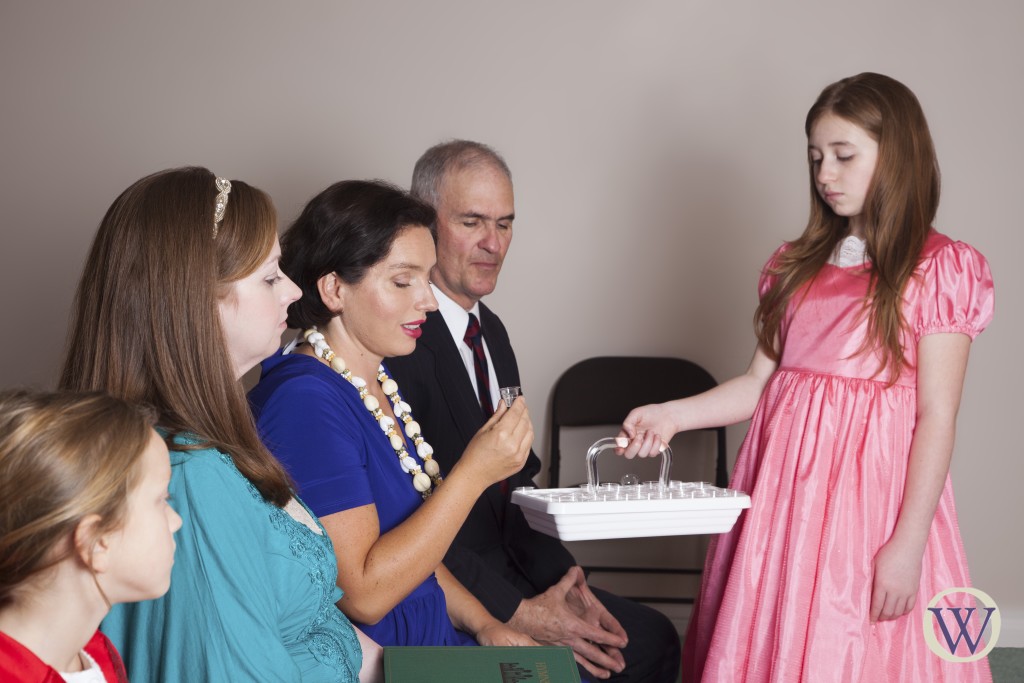 A few weeks ago I sat in sacrament meeting, feeling a mixture of hope and fear. It’s the regular emotional cocktail I live with at church. I desperately want to feel the Spirit, to hear something that will inspire me to more service, more action, and more community. Today was not that day. It wasn’t really anything special—a 5th Sunday high council fest of the most regular order—but the final talk of the day was about the priesthood. My ears perked up and my heart began to race. The speaker shared examples from conference talks and his own life experience. He was sincere and faithful. Then he issued a challenge the young men in the room who hold the Aaronic Priesthood, that they would lengthen their stride and fulfill their responsibilities with vigor and pride.
A few weeks ago I sat in sacrament meeting, feeling a mixture of hope and fear. It’s the regular emotional cocktail I live with at church. I desperately want to feel the Spirit, to hear something that will inspire me to more service, more action, and more community. Today was not that day. It wasn’t really anything special—a 5th Sunday high council fest of the most regular order—but the final talk of the day was about the priesthood. My ears perked up and my heart began to race. The speaker shared examples from conference talks and his own life experience. He was sincere and faithful. Then he issued a challenge the young men in the room who hold the Aaronic Priesthood, that they would lengthen their stride and fulfill their responsibilities with vigor and pride.
And then it hit me: where was the challenge for my daughters? My girls are 10 and 13 (almost) and are bold and intelligent and vivacious and talented. And yet, at the age when their male counterparts in Sunday School are moving into a rapid progression of priesthood authority, my daughters are done. In many ways, by the age of 8, Allison and Dorothy and every other Mormon girl, have achieved all they will in the gospel until they enter the temple, either for a mission or marriage (and even then they will require a man to escort and approve them). So, I wonder again, “Where is the challenge for the young women?” Are they not fit to serve? Are they not fit to bless?
While some may find this calling chasing or may chastise me for aspiring to an office, I say “maybe.” I have always been someone who looked to the rung above me on any ladder or to the position next to me in any group, and wondered if I could learn something there…and I’ve raised two girls who habitually do the same. I don’t think that’s actually a bad thing. We want to try all the things! But I want to be clear: I am not asking for my daughters to be made bishop, or myself to be immediately made an apostle; I am asking that every worthy women in the LDS Church have the same chance to serve afforded to every worthy male. We are asking to be ordained.
Honoring our past,
Envisioning our future.
Debra Jenson, the author of this post, is Ordain Women’s current Board Chair and the chair of the Communications Committee.






